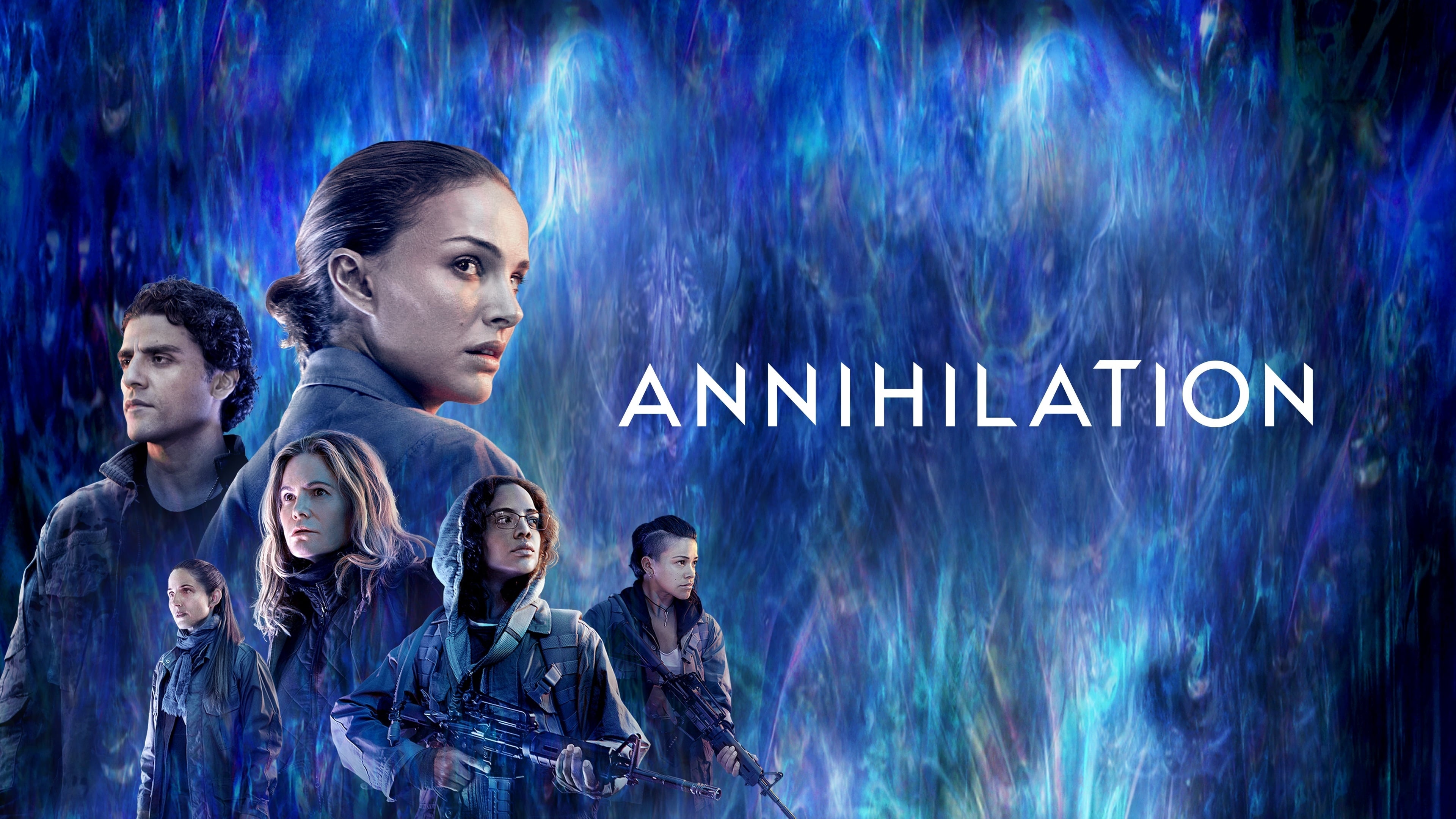Annihilation (2017)

Annihilation (2017), directed by Alex Garland and based on the novel by Jeff VanderMeer, is a cerebral science fiction film that explores themes of transformation, identity, and the unknown. It delves deep into the human psyche while wrapping its narrative in mystery, biology, and the cosmic horror of an ever-evolving, alien landscape. The film is a visually stunning and intellectually challenging meditation on change, self-destruction, and humanity’s relationship with the natural world.
At the center of the story is Lena (Natalie Portman), a biologist and former soldier, whose husband Kane (Oscar Isaac) mysteriously returns home after a yearlong disappearance. Kane had ventured into an area known as “The Shimmer,” a strange, expanding phenomenon that has defied explanation and engulfed a large swath of land. Inside The Shimmer, natural laws appear to be breaking down, with life forms undergoing bizarre and dangerous mutations. As Kane falls gravely ill, Lena volunteers to join a scientific expedition into The Shimmer to find answers and possibly save him.

The team Lena joins is composed of women from various scientific and military backgrounds, each bringing her own expertise and emotional baggage. As they venture deeper into The Shimmer, they encounter increasingly surreal and terrifying landscapes, where plants, animals, and even humans are constantly mutating. The boundaries between species blur, as the film vividly portrays the theme of transformation not just as a biological process but as a reflection of inner turmoil and existential dread. The deeper they go, the more the team faces the unraveling of their own identities and sanity.

One of the film’s central themes is the idea of self-destruction, which manifests on both personal and cosmic levels. Lena, like the other members of the expedition, is grappling with her own guilt and emotional trauma. She feels responsible for her husband’s fate, which leads her to undertake the dangerous mission. Each of the characters, in their own way, is drawn to The Shimmer as an escape from their damaged lives, and the movie subtly suggests that humanity has a self-destructive impulse that drives them to seek out danger or destroy what they cannot understand.

Annihilation also explores the theme of evolution and adaptation in response to an unknown and potentially hostile environment. The Shimmer acts as a microcosm for rapid, uncontrolled evolution, where DNA from different species is being scrambled and fused together. This process mirrors the emotional and psychological transformations happening within the characters, as they are forced to confront the unknown both outside and within themselves. The mutations they witness are not necessarily malevolent, but they are deeply unsettling, challenging their understanding of life and their own sense of identity.
Visually, Annihilation is a masterclass in creating an atmosphere of beauty mixed with terror. The film’s depiction of The Shimmer is both mesmerizing and horrifying, with mutated flora and fauna that are vibrant yet deeply unnatural. Scenes of eerie, crystalized trees and grotesque animal hybrids amplify the sense of otherworldliness, making The Shimmer feel like a living, breathing entity in itself. The film’s most memorable sequence, featuring a mutated bear that emits the screams of one of the characters it killed, is a haunting depiction of how nature can be twisted into something both fascinating and terrifying.

Thematically, Annihilation delves into questions of identity and the self. As Lena moves deeper into The Shimmer, she faces increasingly surreal encounters that challenge her sense of reality and her understanding of who she is. The climax of the film, which takes place inside the lighthouse at the center of The Shimmer, is a stunning, abstract sequence where Lena confronts a doppelgänger-like entity. This confrontation is both a physical battle and a metaphorical one, representing Lena’s struggle with her own destructive tendencies and her quest for meaning in the face of the incomprehensible.
At its core, Annihilation is about the unknown, both external and internal. The alien presence in The Shimmer defies human understanding, and the film resists providing clear answers to the mysteries it presents. This ambiguity has divided some viewers, but it is also one of the film’s greatest strengths. By leaving much open to interpretation, Annihilation invites its audience to reflect on the nature of transformation and the fear of losing oneself in the face of an all-consuming force.
Natalie Portman delivers a compelling performance as Lena, portraying her character’s internal conflict with subtlety and depth. The supporting cast, including Jennifer Jason Leigh as the stoic psychologist Dr. Ventress, Gina Rodriguez as the tough paramedic Anya, and Tessa Thompson as the introspective physicist Josie, all contribute to the film’s tense and atmospheric tone. Each of their characters brings a different perspective on trauma and self-destruction, further enriching the film’s exploration of these themes.

Ultimately, Annihilation is a film that embraces complexity and ambiguity, using its science fiction premise to explore profound philosophical questions. It asks what it means to be human in a world where the boundaries of identity and biology are fluid, and whether humanity can confront the unknown without succumbing to fear or destruction. The film’s haunting visuals, intricate themes, and psychological depth make it a standout entry in the science fiction genre, blending elements of horror, drama, and existential reflection in a way that lingers long after the credits roll.
In conclusion, Annihilation is a visually and thematically rich film that challenges its viewers to grapple with big ideas about change, identity, and the unknown. Its depiction of The Shimmer as both a place of wonder and horror serves as a powerful metaphor for the forces that shape and reshape life itself. By blending hard science fiction with emotional and psychological drama, Annihilation stands as a thought-provoking meditation on humanity’s relationship with nature, its own self-destructive impulses, and the mysteries that lie beyond the limits of our understanding.











